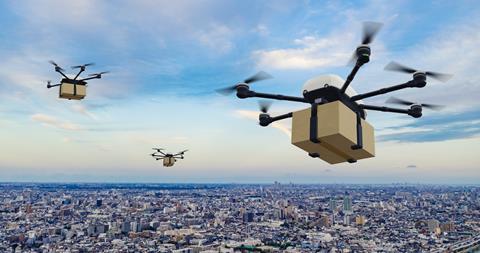
The use of drones in logistics could result in £2.8bn of savings and boost productivity, according to a government report into robotics.
The Department for Business, Energy and Industrial Strategy (BEIS) said investment by companies such as Ocado and Amazon into robotics and autonomous systems (RAS) was already transforming the sector, through large-scale warehouse automation.
It said there will be an estimated 11,000 drones in transport and logistics by 2030, which will represent around 14% of the total number in the UK by the end of this decade.
“It is predicted that drones will be responsible for the delivery of 80% of all items,” the BEIS said.
It noted that challenges remain, such as regulations on airspace, package weights and low margins in the industry, as well as negative public perceptions about the use of drones: “Given these challenges, drone delivery over the medium term is likely to be more feasible for deliveries of large numbers of small items within a short radius, where speed is of the utmost importance, or where traditional delivery methods face challenges,” it said.
The report also highlighted how RAS has the potential to reduce the environmental impact of storing goods: “Automation increases storage density, hence reducing the carbon footprint of warehouse storage as less energy is needed for lighting and heating.
Read more
- COVID-19 “a huge industry wake-up call that puts many jobs at risk”, claims tech expert
- COVID-19 “a huge industry wake-up call that puts may jobs at risk”, claims tech expert
- Digital technologies to power supply chain of the future, say analysts
“In traditional warehouse designs, a large percentage of a warehouse’s square footage is used to access aisles. With high-density deep lane storage systems, access aisles are no longer needed, increasing the number of slots available per square foot.”
The BEIS said that rather than removing human employment from the industry, the adoption of RAS in logistics, such as drones and smart warehouses, could create jobs: “In logistics, the implementation of digital platforms that enable cross-border trade and crowdsourcing of logistics routes could create approximately four million jobs worldwide by 2025, equivalent to a net 8.4% increase in the number of people employed in the industry,” it said.
In the summer, DHL Supply Chain signed a framework agreement with Locus Robotics, which will see it installing 2,000 robots across its global supply chain by 2022.
The assisted picking robots will be mainly used in the company’s e-commerce or consumer warehouses to help with picking and inventory.
DHL said the robots will help reduce time spent on manoeuvring cages through warehouses, lower physical strain on employees, and increase picking efficiency.
XPO Logistics and Nestle also opened a distribution centre this year that relies on sophisticated robotics, automated sorting systems and intelligent analytics.













